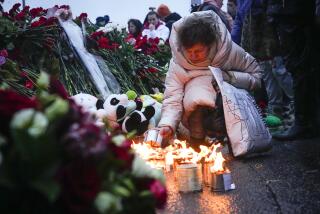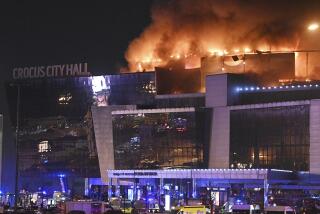Tilting Television Tower Mirrors Russia’s Toppled Self-Image
- Share via
MOSCOW — Another grandiose icon of Russian nationhood has toppled figuratively--and nearly literally.
On Monday, after a virulent electrical fire gutted Moscow’s landmark Ostankino TV tower, officials reported that it was listing slightly.
The bodies of two people were discovered after the fire inside a damaged elevator. Four people had been reported missing--three firefighters and an elevator operator.
The 1,772-foot tower--a triumph of Soviet-era engineering--was the world’s tallest structure when it was completed in 1967, taking the title from New York’s Empire State Building. On Monday, officials were trying to determine whether 33 years after its moment of glory, it would have to be dismantled.
“It doesn’t look really damaged, but we know it is dead inside,” said Sergei Gavrilov, a 41-year-old tourist visiting from the southern Russian city of Armavir, who brought his family to see what was left. “It is like our country on the map of the world.”
President Vladimir V. Putin, still chastened by the sinking of the nuclear submarine Kursk earlier this month, offered the country little comfort.
“This latest accident shows the shape of our vital installations and the overall state of our country,” he said. “We should not fail to see major problems in the country behind this accident.”
Even before the flames were snuffed out, the Russian public--still angry over the government’s bumbling response to the Kursk disaster--began to ask whether the tower’s management had been negligent and whether firefighters had the equipment they needed.
It took 26 hours to extinguish the blaze, which is believed to have been sparked by a short circuit in electrical equipment, belonging to a paging company, that had recently been installed in one of the tower’s highest sections.
The fire forced all national networks off the air Sunday night. Television remained off the air in Moscow and its suburbs Monday, although other regions of the country were receiving programming by satellite.
Trying to display a take-charge attitude, Putin gave officials a week to find a way to restore TV broadcasts in Moscow. Various plans were under consideration, including relaying the signal through cellular phone towers, installing low-power transmitters on city skyscrapers and even using a tethered balloon to float a transmitter 1,200 feet off the ground.
The Ostankino tower, still the world’s second-tallest structure, relayed the signal for Russia’s three main television networks as well as local TV, radio and even emergency communications for the Moscow region.
“It is no good to put all our eggs in the same basket,” lamented Russia’s minister of culture, Mikhail Shvydkoi, in an interview on the Echo of Moscow radio station. “We have to disperse our transmitting devices so we don’t face this situation again.”
Safety officials said about half of the cables forming the skeleton of the tower had been damaged by the heat of the fire, and surveyors reported that it was listing about 2 yards. Engineers said that was within norms.
“Our prognosis is that everything will be fine and there will not be a collapse,” Interior Ministry spokesman Yevgeny M. Ryabtsev told the Reuters news agency. “That’s our hope at present.”
But the police were taking no chances. The hundreds of spectators flocking to the site to see the charred metal needle were herded back about 1,800 feet from the base, enough to give the structure room to fall.
One of them was Raisa Goryachev, a 65-year-old pensioner, who complained that she feels bereft without TV. “I sit at home all day and watch TV. Now I don’t know what to do. I feel very nervous. I feel lost and isolated and, believe me, I can’t stay at home anymore.”
She had tucked a wad of newspapers into her shopping bag, trying to find something to fill the hours. Like many, she saw the fire as yet one more episode in the country’s slow, painful decline.
“Everything is falling apart, everything is collapsing,” she said. “Back in the U.S.S.R., they would have put this fire out in a matter of minutes, and we wouldn’t even find out about it. A disaster even once a year was something totally unusual. Now you start every day with a thought what will happen today. It is a shame. We are losing all the best things we have achieved this century.”
Gavrilov, the tourist, had taken his two children on a tour of the tower just three days ago.
“We were all really impressed and felt very safe and happy,” he said. “It is very sad. The tower was a symbol of our might and progress, and now it is just an empty, burned-out shell.”
The fire also knocked out most cable TV to the Moscow region, so only residents with satellite dishes or those who could tune in to one small UHF station could receive any programming. That meant about 20 million Moscow-area residents were having to adjust to life without television.
“I noticed today that I have never talked so much with my wife as in the last two days,” said Anatoly Lipatov, a 59-year-old pensioner who lives in the shadow of the tower. “She is always glued to the screen, you know, watching soap operas and shows. Now she is finally talking to me. I don’t know whether I can cope with it for more than a week.”
Like many, Lipatov said the tower fire, after the Kursk sinking and a Moscow bomb that killed 12 earlier this month, was demoralizing the country.
“I wonder if Putin would have run for the presidency if he had known what kind of country he is inheriting,” he mused. “We all watched the sub go down and no one could help them. We all watched the tower burn out and no one could save it. What next? When will we get any positive news?
“I forgot,” he added, slapping his forehead in frustration. “We can’t even get any news anymore.”
*
Sergei L. Loiko of The Times’ Moscow Bureau contributed to this report.
More to Read
Sign up for Essential California
The most important California stories and recommendations in your inbox every morning.
You may occasionally receive promotional content from the Los Angeles Times.









